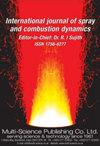用解析还原化学对空气中煤油雾滴点火的欧拉-拉格朗日数值模拟
IF 2.1
4区 工程技术
Q3 ENGINEERING, MECHANICAL
International Journal of Spray and Combustion Dynamics
Pub Date : 2023-10-12
DOI:10.1177/17568277231203620
引用次数: 0
摘要
高空重燃是航空发动机认证的一个关键问题,可以通过两相点火的数值模拟来解决。然而,这种结构是刚性的,并且与局部蒸发相结合可能导致数值问题。本文提供了几种在非结构化大涡流模拟和欧拉-拉格朗日形式理论的背景下,使用解析还原化学进行两相点火模拟的方法。首先,证明了结合局部和动态的刚性化学子循环的指数公式可以在流动时间步长实现稳定的积分。其次,在精细网格中,采用颗粒爆破方法限制拉格朗日点源法引起的刚度影响。然后将这些方法应用于单分散、多组分煤油喷雾在空气中的点火模拟。分析还原化学模型的使用使我们能够详细地描述火焰核形成过程中的化学结构。随着点火过程的进行,燃料浓度会局部升高,这对燃烧过程和火焰核的发展有很大的影响。本文章由计算机程序翻译,如有差异,请以英文原文为准。
Euler–Lagrange numerical simulation of a kerosene droplet mist ignition in air using analytically reduced chemistry
High altitude relight is a critical aspect of the aeronautical engine certification and may be addressed with the numerical simulation of two-phase ignition. However, such configurations are stiff and combined with local evaporation may lead to numerical issues. This paper provides several methods to perform two-phase ignition simulations using analytically reduced chemistry in the context of unstructured large Eddy simulation and Euler–Lagrange formalism. Firstly, an exponential formulation combined with a local and dynamic sub-cycling of the stiff chemistry is demonstrated to allow stable integration at the flow time step. Secondly, a particle-bursting method is applied to limit the impact of stiffness induced by the Lagrangian point-source approach in fine meshes. These methods are then applied in the simulation of ignition of a mono-disperse, multi-component kerosene spray in air. The use of the analytically reduced chemistry model enables us to describe in detail the chemical structure of the flame kernel during its formation. Moreover, local increase of fuel concentration is observed as the ignition proceeds which has a large influence on the combustion processes and the flame kernel development.
求助全文
通过发布文献求助,成功后即可免费获取论文全文。
去求助
来源期刊

International Journal of Spray and Combustion Dynamics
THERMODYNAMICS-ENGINEERING, MECHANICAL
CiteScore
2.20
自引率
12.50%
发文量
21
审稿时长
>12 weeks
期刊介绍:
International Journal of Spray and Combustion Dynamics is a peer-reviewed open access journal on fundamental and applied research in combustion and spray dynamics. Fundamental topics include advances in understanding unsteady combustion, combustion instability and noise, flame-acoustic interaction and its active and passive control, duct acoustics...
 求助内容:
求助内容: 应助结果提醒方式:
应助结果提醒方式:


